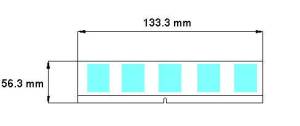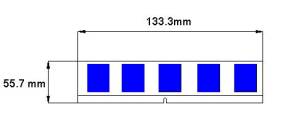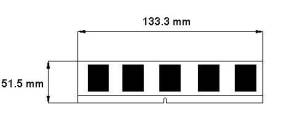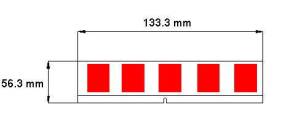Memory-related FAQ
Notes on "Overclocking (XMP)" memory modules
There are two different types of memory modules on the market.
- Modules whose speed specifications correspond with SPD programming:
Memory modules with a native “SPD Speed” (Serial Presence Detect) for example have soldered-on memory chips with a 2400 MHz clock speed and this is just the clock speed the memory addresses, i.e. 2400 MHz.
- Memory modules with speed specifications that correspond with the XMP programming:
Overclocked memory modules often have soldered-on chips with a 2133 MHz base clock speed and are overclocked to, for example, 2400 MHz or higher via the XMP (Extreme Memory Profile) data which is saved on the SPD chip. These chips are therefore automatically overclocked. Because of this, XMP memory modules usually also have a heat sink.
Not all Intel chipset classes (H, Z, Q) support the latter XMP profiles which may cause confusion when XMP memory modules are used.
H chipsets (H270, H370, H410 etc.) cannot read XMP profiles and therefore only work with the native clock speed of the soldered chips. These memory modules are then advertised as 3200 MHz that can be reached via XMP, but basically only the native SPD clock speed of e.g. 2133 MHz can be used.
Only Shuttle products with a Z chipset (Z170, Z270 etc.) can handle XMP and have relevant BIOS options available. Our recommendation: To run the memory controller in the CPU and the RAM synchronously, only modules with a native SPD clock speed should be installed, depending on the CPU used. It is also possible to run 2666 MHz modules in a system with a 2400 MHz memory controller, because the SPD tables usually also have lower values.
Examples for best possible CPU/RAM combinations:
- Intel 8xxx CPU @ 2400 MHz - modules with native 2400 MHz are recommended
- Intel 9xxx CPU @ 2666 MHz - modules with native 2400 MHz are recommended
To find out which memory clock speed is supported by your CPU, please refer to Intel ARK.
If you are unsure about your XMP memory, please check the specifications of your memory manufacturer.
32 GB module support
The following table provides a current overview and will be continuously updated to include compatible XPC models.
Successfully tested modules
DIMM - Crucial: DDR4-2666 32 GB (CT32G4DFD8266.16FB1) - Smart: DDR4-2666 32 GB (ST4096SO420893-SM) SO-DIMM - Samsung: DDR4-2666 32 GB (M471A4G43MB1-CTD)
Please note that a BIOS update may initially be required for some models.
| Product Family | Model | Compatibility | Total Capacity |
|---|---|---|---|
| XPC slim (1.3L fanless) | DS10U | ✔ | 64 GB |
| DS10U3 | ✔ | 64 GB | |
| DS10U5 | ✔ | 64 GB | |
| DS10U7 | ✔ | 64 GB | |
| XPC slim (1.3L) | DH310 | ✔ | 64 GB |
| DH310S | ✔ | 64 GB | |
| DH310V2 | ✔ | 64 GB | |
| DH370 | ✔ | 64 GB | |
| XPC slim (3L) | XH110G | ✔ | 64 GB |
| XH270 | ✔ | 64 GB | |
| XH310 | ✔ | 64 GB | |
| XH310V | ✔ | 64 GB | |
| XH310R | ✔ | 64 GB | |
| XH310RV | ✔ | 64 GB | |
| XPC nano | NC10U | ✔ | 64 GB |
| NC10U3 | ✔ | 64 GB | |
| NC10U5 | ✔ | 64 GB | |
| NC10U7 | ✔ | 64 GB | |
| XPC all-in-one | P51U | ✔ | 64 GB |
| P51U3 | ✔ | 64 GB | |
| XPC cube | SH110R4 | ✔ | 64 GB |
| SH170R6 | ✔ | 64 GB | |
| SH170R6 Plus | ✔ | 64 GB | |
| SZ170R8 | ✔ | 64 GB | |
| SZ170R8V2 | ✔ | 64 GB | |
| SZ270R8 | ✔ | 64 GB | |
| SZ270R9 | ✔ | 64 GB | |
| SH310R4 | ✔ | 64 GB | |
| SH310R4V2 | ✔ | 64 GB | |
| SH370R61) | ✔ | 128 GB | |
| SH370R6V22) | ✔ | 128 GB | |
| SH370R6V2 Plus3) | ✔ | 128 GB | |
| SH370R84) | ✔ | 128 GB |
Intel Optane Memory System Requirements
- Latest BIOS available
- Intel 200-series or 300-series chipset
- Intel 7th Gen (Kaby Lake) or 8th Gen (Coffee Lake) Core i3/i5/i7 processor
- Windows 10 64-bit
- Intel RST driver (from version 15.5.0.1051)
Memory Limits for Windows Releases
Physical Memory Limits: Windows 10
| Version | Limit on X86 | Limit on X64 |
|---|---|---|
| Windows 10 Enterprise | 4 GB | 2 TB |
| Windows 10 Education | ||
| Windows 10 Pro | ||
| Windows 10 Home | 128 GB |
Physical Memory Limits: Windows 8
| Version | Limit on X86 | Limit on X64 |
|---|---|---|
| Windows 8 Enterprise | 4 GB | 512 GB |
| Windows 8 Professional | ||
| Windows 8 | 128 GB |
Physical Memory Limits: Windows 7
| Version | Limit on X86 | Limit on X64 |
|---|---|---|
| Windows 7 Ultimate | 4 GB | 192 GB |
| Windows 7 Enterprise | ||
| Windows 7 Professional | ||
| Windows 7 Home Premium | 16 GB | |
| Windows 7 Home Basic | 8 GB | |
| Windows 7 Starter | 2 GB | ✘ |
What are the maximum dimensions of DDR2/DDR3 memory modules that fit in my XPC?
There are four product series. The max. dimensions of memory modules for each series is:
- G Series: (For all DDR2 or DDR3 G chassis models)

- H Series: (For all DDR2 or DDR3 H chassis models)

- P2 Series: (For SP35P2, SP35P2 Pro, SX38P2 Pro, SX48P2E, SX48P2 Deluxe)

- KPC Series: (For K45 and K48)
